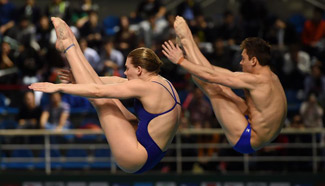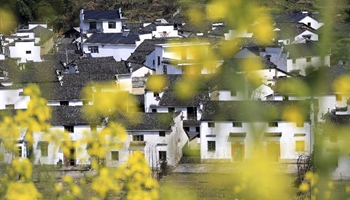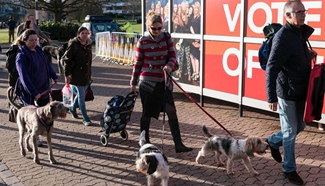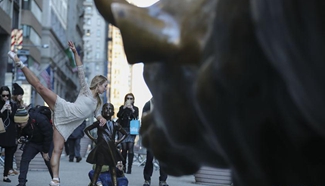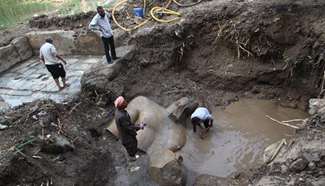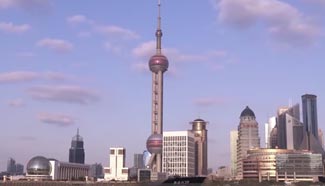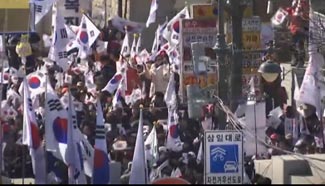by Hummam Sheikh Ali
DAMASCUS, March 11 (Xinhua) -- The United States seems to have chosen the Kurdish-led Syrian rebel fighters to be the force capturing Syria's northern city of Raqqa from the hands of the Islamic State (IS) group.
During the course of the six-year-old war in Syria, the United States supported several rebel groups, which it called "moderates," but such groups failed to live to the exceptions, in part due to their direct or indirect links to the jihadi-themed rebel groups, and due to their failure in scoring a victory against the IS militants.
But when Kurdish People Protection Units (YPG) emerged as reliable factions, the U.S. opted to render support to this group, and allied rebel fighters, which emerged later, such as the Syrian Democratic Forces (SDF), which comprises of Kurds, Arabs and Assyrians.
Such groups have apparently been favored by the U.S., largely because they are consistent, organized, and more importantly have no jihadi background or religious motive behind their cause, Ahmad Ashqar, a Syrian journalist, told Xinhua.
The U.S. backed the YPG in 2015 to recapture areas that fell to the IS in predominantly-Kurdish areas in the northern countryside of Syria's Aleppo province in northern Syria.
The YPG with the support of the U.S.-led anti-terror coalition succeeded to recapture almost all Kurdish areas that had fallen to the IS in northern Syria, and also spread further to have a bigger goal, which is eliminating the IS presence in any Syrian area, including Raqqa, the de facto capital of the terror-designated group.
Last year, the SDF, a YPG-supported group, announced a wide-scale offensive against IS positions near Raqqa, and the initial stage of the battles was to capture areas in the northern countryside of Raqqa, to separate the city from its countryside.
The battles continued for months, until recently, when the SDF with the air cover of the U.S.-led coalition succeeded to cut the road between Raqqa and the IS positions in Deir al-Zour province in eastern Syria on March 6.
With the advance of the SDF, the IS has lost all routes out of Raqqa, save for one through the Euphrates River, according to the Syrian Observatory for Human Rights monitor group.
When that the near-besiege of IS in Raqqa was achieved, Washington sent military gears to the Kurdish-led groups and deployed forces on ground near the city of Manbij in Aleppo countryside to defuse the tension between the Kurdish-led groups and the Turkish-backed ones and to support the campaign toward Raqqa.
The Washington Post said several hundred U.S. Marines have been deployed to Raqqa to assist local forces on the ground in a bid to recapture the city.
The newspaper said that the troops will help in the upcoming battle to oust IS from Raqqa, adding that U.S. Marines will be temporarily stationed at "an outpost from which they can fire artillery guns."
Their positions will be about 20 miles away from IS-controlled areas.
The deployment of the U.S. soldiers is part of a new plan put forward by the Pentagon recently under the order of U.S. President Donald Trump, who pledged to expand the fight against the militants in Syria, Iraq and beyond, during his presidential campaign.
On Friday, the SDF said they have enough forces to capture Raqqa from the IS with the support of the U.S.-led coalition.
"The number of our forces is now increasing, particularly from among the people of the area, and we have enough strength to liberate Raqqa with support from the coalition forces," the SDF spokeswoman, Jihan Ahmed, said.
The SDF also said that IS started moving top commanders out of Raqqa, in apparent anticipation of tough confrontation and possibly the city falling out of the IS control.
For his part, Colonel Talal Silo, the spokesman of the SDF, told Xinhua in a recent interview that the SDF fighters have become in control of 30 percent of the territory in northern Syria with the help of Washington.
He added that the U.S. forces "are our partners within the anti-terror coalition and they have been with us in all of our operations."
Meanwhile, Rami Abdul-Rahman, the head of the Observatory monitor group, said that the major battle for Raqqa is "very close."
He said his monitor group documented the entry of hundreds of vehicles of the U.S.-led coalition to Syria coming from Iraq and headed toward the countryside of Raqqa.
Abdul-Rahman added that the Kurdish-led groups and the backing U.S. forces have besieged Raqqa from several directions.
He added that the IS brought in 230 fighters from the countryside of Hama province in central Syria and Aleppo in the north in anticipation to the battle.
In Deir al-Zour, the SDF continued to advance against IS in the countryside of that oil-rich province, capturing four towns there on Friday following intense battles with IS, according to local Qasioun newspaper.
The report said the SDF fighters have become four kilometers from the key town of Basra west of Deir al-Zour, and 30 kilometers from the city center, which is under the Syrian government control.
With the advance of the SDF, the Turkish forces and allied rebels of the Free Syrian Army (FSA) have been trying to shell positions of the SDF out of Ankara's reluctant to allow the Kurdish-led groups have any role of capturing more areas in northern Syria and Raqqa, as Ankara wants the rebels its backing to do the mission to curb the advance of the SDF and put down any growing Kurdish influence in northern Syria.
Still, the United States, which is an ally of Turkey also, seemed to have drawn the red lines and made itself clear by deploying forces to back the SDF and separate the SDF from the Turkish-backed rebels to avert any fully-fledged confrontation between both sides.
As for the Syrian army, the SDF operations in Raqqa and elsewhere could be a positive thing since there is an undeclared coordination between both forces, observers say.

